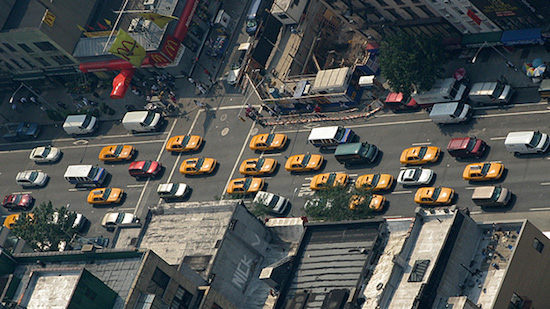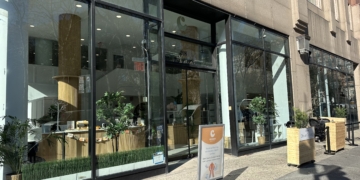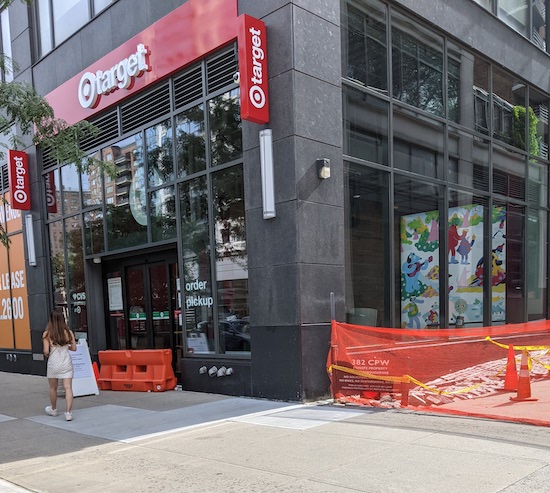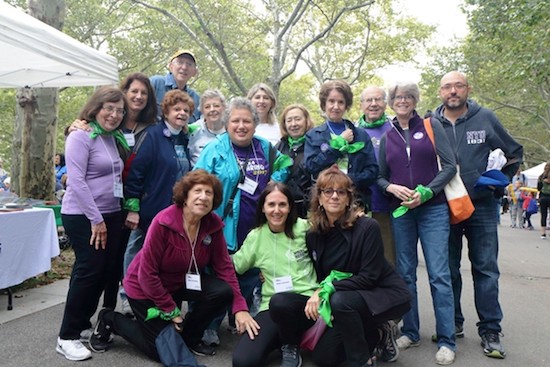
Photo by Bernard & Myrtha Garon.
Congestion pricing, the system of tolls that will charge people to drive into Manhattan below 60th Street, was pushed back from its expected 2021 launch, and is now expected to start no sooner than 2023. The delay is a blow to the MTA’s plans to use the money for system upgrades.
There are a few things that still need to happen. A Traffic Mobility Review Board needs to be appointed to review how much the tolls will cost. And the federal government wants an environmental review that could take 16 months. The review also includes public hearings, which start this month. On the Upper West Side, residents and lawmakers have raised concerns that the tolls could mean an influx of suburban drivers coming into the city and parking in the neighborhood to avoid the tolls. One possible solution discussed in 2019 was to institute resident parking permits, though that was never approved.
The full public hearing schedule, and info on how to participate, is here.
Below are some hearing dates targeted at particular groups:
Manhattan CBD (60th Street and below)
Thursday, September 23, 6-8 p.m.
Register to speak or request services
Manhattan Outside CBD (61st Street and above)
Wednesday, October 6, 6-8 p.m.
Register to speak or request services
And there’s a hearing for New Yorkers to discuss the impacts on minority and low-income communities as well:
New York
Thursday, October 7, 6-8 p.m.









There is little question that congestion pricing is long overdue. The issue is whether, given the ineptness and incompetence of City and State bureaucracy, the plan will be administrated properly and efficiently so that the money raised actually does what i’s supposed to do.
Ian,
I would prefer a major tax on billionaires and pied a terre owners.
There are many non-rich drivers who will be impacted – this is another way to cement Manhattan only for the affluent.
BTW during this Covid year a neighbor regularly purchased and drove supplies to 2 family homeless shelters below 60th Street. Under CP, he’d be paying for his volunteer efforts….
I understand wanting to tax a billionaire who lives here full time but you want an owner of a pied a terre to pay for congestion that they barely contribute to simply because they’re rich? Thats absurd.
It doesn’t matter whether a driver is rich or poor – their cars still cause pollution in our neighborhood. Reducing the amount of traffic is essential to increasing the health and livability of the upper west side.
Josh,
Seems to me to reduce vehicles, building development (which inevitably generate vehicles) should be curtailed and able-bodied residents should walk to stores instead of ordering Amazon etc.
Also no more food trucks (they really pollute) and carts.
Bus and subway fare should be lower and service increased to encourage ridership
Unfortunately none of this will happen….
If we are trying to reduce traffic globally and not just in our own backyards, we have an obligation to add as much housing as possible in walkable neighborhoods like the Upper West Side. Someone who lives in the suburbs has the take a car for almost every trip, whether they are able bodied or not. If that person could live here instead they could walk or take public transit for a significant number of trips.
Why would development need to be curtailed? The congestion zone has the best public transportation in the nation.
The costs for individual deliveries within the zone will be minuscule.
There is little question that the plan will not be administered properly nor efficiently and the money raised will be misspent or pilfered. Thus congestion pricing is likely to be a boondoggle that costs residents greatly without many of the intended benefits. Traveling to or living in Manhattan will just get much more expensive (the cost of bringing goods into the borough will have to be paid by its residents).
Along with congestion pricing residential permits should also be put in place. There are too many out of state cars parking on our streets some are residents that live in NYC as their primary residence yet purchase and register vehicles in another state to avoid sales tax and insurance costs. Out of state plates should have time limited parking (4 hours for example).
i agree
I entirely agree on residential permits. With spaces designated for hybrids and EVs that have charging stations. Obviously some spaces for non-residents will be available, but commuters will find them scarce. Hopefully that will push people to public transport.
There have been two white Honda Accords with red TN dealer plates on 94 between Columbus and Amsterdam for months now. There used to be a third but I haven’t seen that one in a while.
Residential parking permits are a terrible and elistist idea. Why should UWSers with a car 24/7 be given privileges not conferred to UWSers who occasionally rent and park a car?
Car owners are part of the pollution and congestion problem. They should not be given prizes for this.
If we are going to have residential parking permits, they need to be given to or available for purchase by ALL residents, not just those who own cars.
Otherwise, it would be better to have meters everywhere, so all drivers pay the same effective parking tax.
Please bear in mind that the people who park on the streets – and thus are affected by meters or residential permits or alternate side parking for that matter – are the NON affluent. Car owners who can afford to do so park in the lots. So what is really being proposed is further hurting only the working class. Separately, congestion pricing is regressive – hurting those who actually live here and have elderly family or large families who cannot be otherwise transported or must work for a living outside of commuting lines. Those people who are affluent don’t feel the pinch and will not change behavior bec congestion pricing- they can afford it. It’s the NON affluent at issue. What about caring for those who are trying to make ends meet?
Take a walk down any block in the neighborhood and count the number of Mercedes, BMWs, Audis, Land Rovers and other luxury brands. There’s even a Maserati that parks around 75th sometimes! You won’t have to walk far to see that the idea that “everyone who uses street parking is working class” isn’t anywhere close to true.
It really doesn’t matter though – working class cars cause pollution and congestion too!
Federal legislation is being introduced to exempt NJ drivers from NYC congestion tax, either directly or through federal tax rebates. If that goes through, what is the point of this tax, except to penalize NYers.
https://www.insidernj.com/press-release/gottheimer-announces-federal-legislation-fight-back-new-york-congestion-tax-protect-new-jersey-residents-commuters/
https://www.google.com/amp/s/reason.com/2021/08/12/new-jersey-congressmen-want-to-exempt-new-jersey-drivers-from-new-yorks-congestion-tolls/%3famp
Want to make a bet that this makes it through Congress. I’ll put up 5k that says this bill dies and dies hard. The cost for an NJ pol to propose a populist bill benefitting his constituents : 0. The cost to him when it dies in committee : 0.
Will New Yorkers be exempted from the rediculously hight tolls on the New Jersey Turnpike and Garden State Parkway?
Jersey is literally a choke point for over 30 million people getting to and from NY and New England and they gouge like crazy.
In the city that never sleeps – this will never happen
And it should NOT happen.
You want to slow down the number of out of Manhattan cars coming in?
Institute a high price on entering the city, on ALL bridges & tunnels.
How about $30? This will eliminate 50% of the cars coming in.
Resident parking permits have worked well in other major metropolitan areas and should definitely be considered as part of the parking and driving equation here in NYC. Residents should, of course, have to pay for such permits, but having them in use would improve the current situation, which sees too many spots occupied permanently by out-of-state cars.
How about a different kind of congestion pricing: increase fees for dog licenses. More dogs on leashes produce congested sidewalks, not to mention dog residue on sidewalks. Dogs on leashes expand the amount of sidewalk space occupied by people walking dogs, especially with those expanded leashes. People with dogs in little strollers could request a reduced license fee.
Let’s do the same for strollers. And children.
Pre-covid I was generally in favor of this. Now I think it is a really bad idea. Commercial real estate is really struggling and this will not help the situation. I know everyone here hates the big bad corporations but they create a lot of jobs (both primary and secondary, such as food service, janitorial, etc.) and pay a lot of taxes. This will just make things more difficult for them.
LOL. More incompetence from city and state government. Parking uptown has disappeared due to Covid Shanties and now congestion pricing is supposed to come? NO ONE will come into NYC anymore, not for fun, not for work. Talk about killing the goose that lay the golden egg.
Why 60th Street as the border for congestion pricing? If you need to load/unload a vehicle, you pay a congestion fee if you live on 60th St, but don’t pay a fee if you live on 61st St? It’s a completely arbitrary Berlin Wall running through the middle of residential neighborhoods. If there’s going to be a congestion fee zone it ought to be all of Manhattan, not running down the middle of a block that people live on.
The CBD and Financial District are universally defined as Manhattan below 60th Street.
You can exempt or rebate residents of that area with little problem. You can’t if you go into the almost totally residential areas north of 60th St.
…except that the proposed plan doesn’t exempt or rebate residents. The London congestion plan, which is often cited as a model, does give a large discount to residents of the zone. The NYC plan emulates the London plan is all respects EXCEPT this one. Believe me, any car owner below 60th street is not the cause of mid-town congestion; they are not driving to their mid-town offices, nor putting the family in their car to drive to a Broadway show. They mainly use their cars to leave the city.
If you live in Midtown and only ever use your car to leave the city, you still have to drive through Midtown, creating traffic and pollution in Midtown. Just because you drive out of the zone first and back into it second doesn’t mean your trip causes any less congestion or air pollution than someone who does the opposite.
If I bring my child home from college north of the city at the end of the semester and unload the car at my home on 61st street I wouldn’t pay a congestion fee, but if I live on 60th street I would pay a congestion fee. Both addresses are in the same council district, the same school district, pay the same taxes, yet one is treated differently, based on what block in a neighborhood one chose to live on, years before congestion pricing was even imagined. My argument is that geographic boundaries are the customary placement for tolls — make all of Manhattan the congestion zone at the river crossings — rather than penalizing residents depending on which block within a neighborhood they happen to live on. If a resident of downtown Brooklyn or any other neighborhood in NYC can, say, drive an elderly parent a few blocks to a doctor in the neighborhood without a fee, why should someone who lives on 60th street in Manhattan be treated differently? If you picked the wrong block to live on 20 years ago, it’s just too bad for you, right? People outside the congestion zone have the option of avoiding or going around it. People already living inside the zone don’t.
How is it arbitrary? They’re putting tolls on all of the free bridges essentially. The 59th street Bridge is the last one….
I don’t think I can articulate why, but congestion pricing just seems like a bad idea to me. As others have said, it will probably have unintended consequences. Also, the main cheerleaders for this don’t really have a great record. Everyone knows that driving in midtown is difficult and anyone who chooses to do so knows what they are in for. Raise taxes a different way please.
Why should driving in one of the most public transportation rich areas in the world be easy or necessary?
If you don’t want to pay the fee, then use the subway, bus, train, etc.
The universal ease and convenience of trains and buses is a myth. The author of the comment above cheerleading it may not have elderly parents or multiple small children who have to deal with baby carriages and walkers and wheelchairs which cannot be negotiated swiftly and easily onto and off buses and down to trains. Additionally, it is a myth that public transportation is ubiquitous – is only great if your work and home readily connect via the lines. A bunch of us have to to take mult buses or trains to get to work. The transfers are crazy. commuting time even in a high train bus zone can br nightmarishly long if you don’t luck out re work/home.
The anti-car people don’t seem able to acknowledge that there are a lot of people whose lives are such that a car is a necessity. Jobs, family responsibilities, etc., often lie outside Manhattan and aren’t reasonably accessable by transit.
The transit system is designed to efficiently bring people to and from the Central Business District and Financial District from various residential neighborhoods in and around the Five Boros.
If you need to get from one residential neighborhood (the UWS) to another? If transit works it’s happenstance. If not, you drive. And if you have to do it often? You get a car.
And that is a perfectly reasonable approach to living.
_
You misunderstand me, Brandon. I am for congestion pricing. I am arguing that, in residential neighborhoods like ours, a car can be a necessity and the decision to own one is rational.
You seem to misunderstand what congestion pricing is, Paul. It would not ban all private car use in the city.
Rather, residents would be able to keep their cars under congestion pricing. People would also be able to continue using cars to drive south of 60th St. It would just cost them more money to do so.
And if you think that’s unfair to the tiny proportion of downtown households described in your scenario — i.e. all the people who live in Manhattan south of 60th St. but must regularly drive out of the city — why do their comparatively small financial interests here outweigh the needs of the countless other NYC households who depend on adequately funded public transit and clean air?
Luxury is a word, and all words have defintions.
A luxury is something you don’t “need.” Or it’s something you “need” but you get in excess (a Rolex instead of a Timex).
Someone whose responsibilities include leaving a residential area of NYC for another area not served by transit has a need, not a luxury.
And with many households, one member may have that need while another works within the CBD or FiDi and can take a subway.
So they should both just up and leave?
Why?
A car is a luxury here. If you don’t want to pay the costs of that luxury, there’s lots of the country for you to choose from.
What about Manhattan residents who reverse commute? I live on W/79th and work in Hoboken. I leave the city via the Lincoln Tunnel. Why should I be penalized for commuting to work? And don’t tell me to take the GWB as that is logistically inane.
The way the plan is set up, as long as you take the West Side Highway to the tunnel, you wont be paying a toll.
In 2026 electric flying cars will be available to the general public. I hope the congestion pricing scheme also applies to flying cars else that would be completely unfair.
Concerned about the white placard for disabled. Will they have to pay for going below 60 Street, Doctors appts, etc?
I agree with Mary as I have lived in cities that require the use of resident parking stickers to park in residential areas. The use of stickers has been in effect successfully since the late 1970s in Boston and Cambridge, Mass. And I know some other cities use the sticker system.
What about residents of upper Manhattan who do not drive but take cabs to go to doctors appointments because they cannot travel on subway or bus? Why are non drivers being penalized? Why are residents being penalized?
what, if any, accommodations for HANDICAPPED whose physicians and hospitals are in Manhattan?
and/or coming in from Bklyn, Staten Island,Queens?????????????????????????
The mayor congestwd the roads with Uber ,Lyft care to the tune of over 100,000 cars they are the ones who should be paying congestion pricing not regular folks ,The mayor create this mess and now wants all to pay for his screw up ,find it unfair to start telling when all congestion is car services and delivery trucks. The city will still make millions of dollars without tolling regular folks.
Residential Parking Permits, vistor’s should park in Garages/Parking Lots. Those who live in said area should not be charged a toll, we live here! I shouldn’t have to pay to enter and park in my neighborhood.
Congestion pricing is in effect on all taxi fares for quite some time already. How is that fair when the start date for other vehicles has been delayed until 2023?
many other cities have managed very well with congestion fees and resident parking – why is Manhattan special? And BTW – half of the cars on my block have their Hamptons summer stickers on them and they’re gone every weekend – so enough already with the poor people argument.
I live on West 63rd and worry this will become a drop off pick up block to avoid the toll. More cars will be turning North off 62nd and 63rd street on a already congested Broadway which will back the traffic up to CPW and up CPW. These two blocks will be a disaster.
There will surely be a need to fine-tune the implementation, but in my college Econ 101 course, we called this “pricing in externalities.” Very happy to see this move forward!
Let’s hope this gets implemented soon! Personally I’d like to breathe less polluted air, be safer biking in the city, and have better funded subways and buses. Any big city – especially NYC – should be looking at ways to reduce the number of cars driving around the city and stop them from forcing pedestrians to breathe their poisonous exhaust.